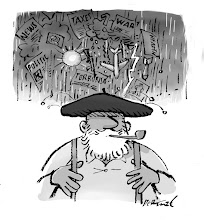Friday, May 31, 2019
Thursday, May 30, 2019
Wednesday, May 29, 2019
Tuesday, May 28, 2019
Monday, May 27, 2019
Sunday, May 26, 2019
Saturday, May 25, 2019
Friday, May 24, 2019
Thursday, May 23, 2019
Wednesday, May 22, 2019
Tuesday, May 21, 2019
Monday, May 20, 2019
Sunday, May 19, 2019
On Holidays
The Beret Project is on holidays from today; back to the country of my birth, spiced up with trips to Belgium, France and Germany.
Never truly on holiday, I am sure I'll come back with loads of beret-related material.
In the meantime, until 11 June, every day an interesting, beautiful, funny, sexy, historic, special photo by means of daily post.
All orders placed between today and 11 June will be shipped on 11 June or earlier (as some orders will be taken care of during my absence).
See you all in 3 weeks time!
Never truly on holiday, I am sure I'll come back with loads of beret-related material.
In the meantime, until 11 June, every day an interesting, beautiful, funny, sexy, historic, special photo by means of daily post.
All orders placed between today and 11 June will be shipped on 11 June or earlier (as some orders will be taken care of during my absence).
See you all in 3 weeks time!
Saturday, May 18, 2019
Lenn E. Goodman
Professor of Philosophy Lenn E. Goodman's interests center on metaphysics and ethics, and he has paid special attention over the years to Islamic and Jewish philosophical thought and their creative interactions.

Friday, May 17, 2019
Peter Neill - World Ocean Observatory
Peter Neill, a graduate of Stanford University, is the director of the World Ocean Observatory.
Looking around us, we see a world wounded by the history of our ideas and actions. We are seeking solutions to the critical challenges of carbon, water, food, energy, and health as essential elements of human survival. Ultimately, those solutions will be found in the ocean--sequestered CO2, desalinated fresh water, sustainable protein production, geothermal and alternative energy technology, the medicines necessary to assure our well-being, and the new values and changed behaviors for successful living. This perspective informs the World Ocean Observatory, a unique, web-based place of exchange of information and educational services about the ocean defined as "an integrated, global, social system." Peter Neill, W2O founder and director, will present his personal journey to this understanding, an overview of the present, critical situation, and some provocative ideas for the future of the one ocean that connects us all.
Looking around us, we see a world wounded by the history of our ideas and actions. We are seeking solutions to the critical challenges of carbon, water, food, energy, and health as essential elements of human survival. Ultimately, those solutions will be found in the ocean--sequestered CO2, desalinated fresh water, sustainable protein production, geothermal and alternative energy technology, the medicines necessary to assure our well-being, and the new values and changed behaviors for successful living. This perspective informs the World Ocean Observatory, a unique, web-based place of exchange of information and educational services about the ocean defined as "an integrated, global, social system." Peter Neill, W2O founder and director, will present his personal journey to this understanding, an overview of the present, critical situation, and some provocative ideas for the future of the one ocean that connects us all.
Thursday, May 16, 2019
Walt Whitman - Goodbye my Fancy
Here is a virtual movie of the great Walt Whitman reading "Goodbye my fancy" which he wrote in 1891 his final year as something of an epitaph by this time his health was in steep decline.
Walt Whitman (1819-1892 was born in Long Island, New York, the son of a Quaker carpenter. Whitman's mother was descended from Dutch farmers. Good-bye My Fancy shows us a dying Whitman who is no longer fighting the inevitable, but rather embracing it. In Good-bye My Fancy, Whitman is giving his farewell address to his audience as he knows that he will soon be dying. Throughout his poetry he has turmoil with death and the idea of his own mortality. However, in this final poem, Whitman is accepting of his fate. Whitman begins this poem by saying that he doesn't know how much longer he will be around or to where he will be next, but he doesn't seem worried by this. Whitman is speaking to his reader as his love which makes this goodbye very intimate.
Wednesday, May 15, 2019
Madhur Jaffrey and Mr Cardamom
Madhur Jaffrey (85) is surprising old fans and winning new
ones with her latest guise as a grandma MC in a music video for a New
York-based rapper.
The Delhi-born actor, who trained at London’s Royal Academy
for the Dramatic Arts, then published a series of influential cookbooks, stars
in the film clip for the track Nani – Hindi for maternal grandmother – by the
hip-hop artist Mr Cardamom.
“I’m the best damn
nani that you ever done see,” she tells her son, after he berates her for
neglecting her grandmotherly duties. “Fuck top five nanis and fuck top three,
I’m the number one nani, don’t fuck with me.”
Jaffrey refused to accept payment for her role in the video clip, but insisted on keeping the yellow beret.
Tuesday, May 14, 2019
Sonny Rollins
Sonny Rollins, live in Denmark, 1968.
With Niels-Henning Ørsted Pedersen on bass, Albert 'Tootie' Heath on drums and Kenny Drew on piano.
Monday, May 13, 2019
Sunday, May 12, 2019
Man of Montmartre
Man of Montmartre - A novel based on the life of Maurice Utrillo by Stephen Longstreet and Ethel Longstreet.
This biographical novel about Maurice Utrillo, half mad genius, alcoholic and one of the greatest painters of the century, is set against the background of Paris from the 1880's to the 1920's. Through the crooked streets of Montmartre which he was to immortalize, wanders Maurice, the illegitimate child of artist and model Suzanne Valadon; a teen-age drunkard who took up painting as work therapy; the friend of Modigliani and finally awarded the Legion of Honour.
This biographical novel about Maurice Utrillo, half mad genius, alcoholic and one of the greatest painters of the century, is set against the background of Paris from the 1880's to the 1920's. Through the crooked streets of Montmartre which he was to immortalize, wanders Maurice, the illegitimate child of artist and model Suzanne Valadon; a teen-age drunkard who took up painting as work therapy; the friend of Modigliani and finally awarded the Legion of Honour.
Saturday, May 11, 2019
La Classe Operaia va in Paradiso
La classe
operaia va in paradiso (released in the US as Lulu the Tool) is a 1971
political drama film directed by Elio Petri.
It depicts a
factory worker's realisation of his own condition as a simple "tool"
in the process of production and, implicitly, his struggle with the trade
unions.
Lulu Massa is
a highly productive worker at a factory paying piece work but is disliked by
his colleagues as his efficiency is used by management to justify their demands
for higher output. While employees are told to care for and rely on their
machines, they see radical students outside the factory campaigning for higher
pay rates and less work.
The film
competed at the 1972 Cannes Film Festival, where it tied for the Grand Prix
International du Festival, the highest honour. In Italy, it also won the David
di Donatello for Best Film.
Friday, May 10, 2019
Thursday, May 9, 2019
Wednesday, May 8, 2019
Tuesday, May 7, 2019
Boer (Dutch Farmer)
Dutch farmer, dressed as was typical during the middle of last century: alpinopet (beret), blue chore jacket and trousers, wooden shoes.
Monday, May 6, 2019
True Basque Berets from France!
For many decades, the only true “Basque” beret manufacturer was Boinas Elósegui (from Tolosa, in the Spanish Basque Country). Not anymore though, as Le Béret Français has moved its factory from Làas (in Béarn) to Bayonne (the capital of the French Basque Country).
 Le Béret Français has done extremely well, since starting only 6 years ago. Numbers are up, but much better in my opinion, is the enormous work they have done to re-popularize the beret.
Le Béret Français has done extremely well, since starting only 6 years ago. Numbers are up, but much better in my opinion, is the enormous work they have done to re-popularize the beret.
 Although Béarn is the birthplace of the beret, I really like the fact that after some 40, 50 years, there are again Basque berets made in the French Basque Country. With the move to Bayonne, Le Béret Français has expanded its range of berets with some really beautiful models. Made from Pyrenean spun Merino wool, the ‘Vintage Béret Basques-Français’ berets are knitted in a higher density (weight) and fitted with beautiful long vanished traditional French-Basque beret labels. These Vintage Béret Basques-Français have the Le Béret Français trademark red cabillou.
Although Béarn is the birthplace of the beret, I really like the fact that after some 40, 50 years, there are again Basque berets made in the French Basque Country. With the move to Bayonne, Le Béret Français has expanded its range of berets with some really beautiful models. Made from Pyrenean spun Merino wool, the ‘Vintage Béret Basques-Français’ berets are knitted in a higher density (weight) and fitted with beautiful long vanished traditional French-Basque beret labels. These Vintage Béret Basques-Français have the Le Béret Français trademark red cabillou.
 Another exclusive by Le Béret Français are the ‘Bérets Marbré’. Berets made of 100% Merino wool with a marbled (camouflage-like pattern) that are not only extremely comfortable to wear, but also absolute head turners.
Another exclusive by Le Béret Français are the ‘Bérets Marbré’. Berets made of 100% Merino wool with a marbled (camouflage-like pattern) that are not only extremely comfortable to wear, but also absolute head turners.
 New in the range of Éco Bérets Printemps are the ‘Rouille’ (rust) and Wild Blackberry.
New in the range of Éco Bérets Printemps are the ‘Rouille’ (rust) and Wild Blackberry.
 Last in the range of new wool models, is the Béret Casquette in khaki; a beret made in Bayonne and finished in the Pays de la Loire. South Pacific Berets has now 2 dedicated pages of Le Béret Français berets: wool models and Éco/cotton models.
Last in the range of new wool models, is the Béret Casquette in khaki; a beret made in Bayonne and finished in the Pays de la Loire. South Pacific Berets has now 2 dedicated pages of Le Béret Français berets: wool models and Éco/cotton models.







Louis Deltour
Louis Deltour set up the artists' collective Forces Murales together with his companions Dubrunfaut and Somville, in 1947.
They wrote a manifesto that expressed their strong commitment to the major social and political issues of their time. The collective used the creation of "a public art that glorifies the life and work of the people, their struggle, their suffering, their joy, their victories and their hope".Deltour left Forces Murales in 1953 and six years later the collective would be completely defunct. The three founders each went their separate ways.
Dubrunfaut and Somville gained international fame. Deltour, however, remained an almost unknown artist. Not because of a lack of talent, but because money and fame did not interest him. He preferred to stay in his rural homeland, where he consistently worked on an oeuvre portraying the working class. An oeuvre with which he wanted to mobilize that working class to break the prevailing bourgeois thinking and to strive for a different society.
 |
| Louis Deltour's son |

Subscribe to:
Posts (Atom)
















































